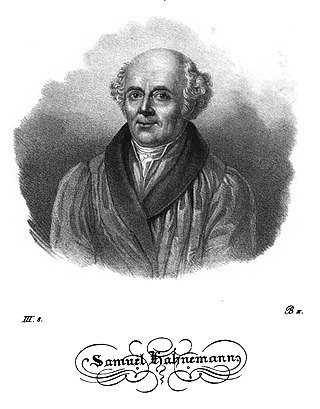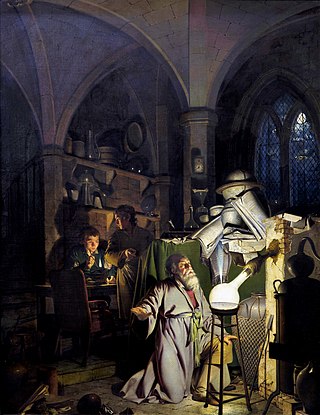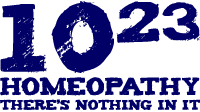Related Research Articles

Homeopathy or homoeopathy is a pseudoscientific system of alternative medicine. It was conceived in 1796 by the German physician Samuel Hahnemann. Its practitioners, called homeopaths or homeopathic physicians, believe that a substance that causes symptoms of a disease in healthy people can cure similar symptoms in sick people; this doctrine is called similia similibus curentur, or "like cures like". Homeopathic preparations are termed remedies and are made using homeopathic dilution. In this process, the selected substance is repeatedly diluted until the final product is chemically indistinguishable from the diluent. Often not even a single molecule of the original substance can be expected to remain in the product. Between each dilution homeopaths may hit and/or shake the product, claiming this makes the diluent "remember" the original substance after its removal. Practitioners claim that such preparations, upon oral intake, can treat or cure disease.

Naturopathy, or naturopathic medicine, is a form of alternative medicine. A wide array of practices branded as "natural", "non-invasive", or promoting "self-healing" are employed by its practitioners, who are known as naturopaths. Difficult to generalize, these treatments range from the pseudoscientific and thoroughly discredited, like homeopathy, to the widely accepted, like certain forms of psychotherapy. The ideology and methods of naturopathy are based on vitalism and folk medicine rather than evidence-based medicine, although practitioners may use techniques supported by evidence. The ethics of naturopathy have been called into question by medical professionals and its practice has been characterized as quackery.

Quackery, often synonymous with health fraud, is the promotion of fraudulent or ignorant medical practices. A quack is a "fraudulent or ignorant pretender to medical skill" or "a person who pretends, professionally or publicly, to have skill, knowledge, qualification or credentials they do not possess; a charlatan or snake oil salesman". The term quack is a clipped form of the archaic term quacksalver, derived from Dutch: kwakzalver a "hawker of salve" or rather somebody who boasted about their salves, more commonly known as ointments. In the Middle Ages the term quack meant "shouting". The quacksalvers sold their wares at markets by shouting to gain attention.

Allopathic medicine, or allopathy, is an archaic and derogatory label originally used by 19th-century homeopaths to describe heroic medicine, the precursor of modern evidence-based medicine. There are regional variations in usage of the term. In the United States, the term is sometimes used to contrast with osteopathic medicine, especially in the field of medical education. In India, the term is used to distinguish conventional modern medicine from Siddha medicine, Ayurveda, homeopathy, Unani and other alternative and traditional medicine traditions, especially when comparing treatments and drugs.

The history of pseudoscience is the study of pseudoscientific theories over time. A pseudoscience is a set of ideas that presents itself as science, while it does not meet the criteria to properly be called such.
Anthroposophic medicine is a form of alternative medicine based on pseudoscientific and occult notions. Devised in the 1920s by Rudolf Steiner (1861–1925) in conjunction with Ita Wegman (1876–1943), anthroposophical medicine draws on Steiner's spiritual philosophy, which he called anthroposophy. Practitioners employ a variety of treatment techniques based upon anthroposophic precepts, including massage, exercise, counselling, and administration of substances.

Steven Paul Novella is an American clinical neurologist and associate professor at Yale University School of Medicine. Novella is best known for his involvement in the skeptical movement as a host of The Skeptics' Guide to the Universe podcast and as the president of the New England Skeptical Society. He is a fellow of the Committee for Skeptical Inquiry (CSI).

Siddha medicine is a form of traditional medicine originating in southern India. It is one of the oldest systems of medicine in India.
George Vithoulkas is a Greek teacher and practitioner of homeopathy.
Homeoprophylaxis, or homeopathic prophylaxis, is the use of homeopathy, a pseudoscience, as a preventive medicine or immunisation against serious infectious diseases.

Homeopathy is fairly common in some countries while being uncommon in others. In some countries, there are no specific legal regulations concerning the use of homeopathy, while in others, licenses or degrees in conventional medicine from accredited universities are required.
The Ministry of Ayush, a ministry of the Government of India, is responsible for developing education, research and propagation of traditional medicine and alternative medicine systems in India. Ayush is a name devised from the names of the alternative healthcare systems covered by the ministry: ayurveda, yoga & naturopathy, Unani, Siddha, Sowa Rigpa, and homeopathy.

The 10:23 Campaign (stylized as 1023) is an awareness and protest campaign against homoeopathy organised by the Merseyside Skeptics Society, a non-profit organisation, to oppose the sale of homoeopathic products in the United Kingdom. The campaign has staged public "overdoses" of homoeopathic preparations.
Homeopathy is a peer-reviewed medical journal covering research, reviews, and debates on all aspects of homeopathy, a pseudoscientific form of alternative medicine. It is the official journal of the London-based Faculty of Homeopathy. The journal was established in 1911 as the British Homoeopathic Journal, resulting from a merger between the British Homoeopathic Review and the Journal of the British Homoeopathic Society. It uses its current name since 2001 and the editor-in-chief is Robert Mathie.

The Good Thinking Society is a nonprofit organisation promoting scientific scepticism established by Simon Singh in September 2012.

Homeopathy Plus! is an Australian company run by homeopath Fran Sheffield in Tuggerah, New South Wales. It is known for the claim that homeopathy is an effective, and safer, alternative to vaccination for conditions including whooping cough, along with claims that homeopathy is superior to chemotherapy for cancer. The claims for "homeoprophylaxis" were assessed as misleading by the Complaints Resolution Panel of the Therapeutic Goods Administration and a retraction demanded; this was ignored. The prophylaxis claims were referred to the Australian Competition & Consumer Commission (ACCC), and although this was stated to have resulted in their removal, legal proceedings continued, culminating in a ruling by Justice Perry of the Federal Court of Australia in December 2014 that:

Michael "Marsh" Marshall is a British skeptical activist and the editor of The Skeptic magazine since September 2020. He is the co-founder and vice-president of the Merseyside Skeptics Society and co-host of its official podcast, Skeptics with a K, project director of the Good Thinking Society, and has occasionally written for The Times, The Guardian and New Statesman. As of 2022, Marshall is a fellow with the Committee for Skeptical Inquiry.
CEASE therapy is a pseudoscientific practice used by naturopaths who claim that it can treat or even cure people with autism, claims which have been adjudicated by the UK's Advertising Standards Authority as "bogus". It involves a mixture of supplements, high-dose vitamin C, 'orthomolecular support', dietary restrictions, and homeopathy. The therapy was developed by Dutch doctor Tinus Smits, who claimed to have used it to treat over 300 children with autism. It became more notable in 2017/2018 because of regulatory action taken by professional bodies in The Netherlands, UK, and Canada following a series of complaints about unfounded claims.
The Society of Homeopaths (SoH) is a British private limited company formed in 1978 by "a small group of homeopaths who were keen to work together for the development of the profession and to ensure high standards in the practice of homeopathy" and at September 2018 had 997 members on the Society's register who can refer to themselves as RSHoms. The SoH's register was first accredited by the Professional Standards Authority (PSA) in September 2014 allowing members to display the Accredited Register's logo at the time. In January 2021 the PSA suspended the society's accreditation for failure to meet standards the PSA had set.
The infinitesimally low concentration of homeopathic preparations, which often lack even a single molecule of the diluted substance, has been the basis of questions about the effects of the preparations since the 19th century. Modern advocates of homeopathy have proposed a concept of "water memory", according to which water "remembers" the substances mixed in it, and transmits the effect of those substances when consumed. This concept is inconsistent with the current understanding of matter, and water memory has never been demonstrated to exist, in terms of any detectable effect, biological or otherwise.
References
- ↑ "Call to remove homeopathics from shops". TVNZ. Retrieved 2012-01-21.
- ↑ Holt, Shaun (3 October 2008). "The responses of alternative practitioners when approached about common childhood illnesses". The New Zealand Medical Journal . 121 (1283). ISSN 1175-8716. Archived from the original on 14 July 2012.
- ↑ Tuomela, R (1987). "Chapter 4: Science, Protoscience, and Pseudoscience". In Pitt, JC; Marcello, P (eds.). Rational Changes in Science: Essays on Scientific Reasoning. Boston Studies in the Philosophy of Science. Vol. 98. Springer. pp. 83–101. doi:10.1007/978-94-009-3779-6_4. ISBN 978-94-010-8181-8.
- ↑ Smith, K (2012). "Homeopathy is unscientific and unethical". Bioethics . 26 (9): 508–12. doi:10.1111/j.1467-8519.2011.01956.x. S2CID 143067523.
- ↑ Baran, GR; Kiana, MF; Samuel, SP (2014). "Chapter 2: Science, Pseudoscience, and Not Science: How Do They Differ?". Healthcare and Biomedical Technology in the 21st Century. Springer. pp. 19–57. doi:10.1007/978-1-4614-8541-4_2. ISBN 978-1-4614-8540-7.
within the traditional medical community it is considered to be quackery
- ↑ Holt, Shaun; Gilbey, Andrew; Colquhoun; David; Baum, Michael; Ernst, Edzard (15 April 2011). "Call for doctors not to practice homeopathy or refer to homeopaths". New Zealand Medical Journal. 124 (1332): 87–88. ISSN 1175-8716. PMID 21747430.
- ↑ Anderson, Charles (22 January 2012). "Kiwis big believers in homeopathy". Sunday Star Times.
- ↑ "Page 2 Advertisements Column 6". Daily Southern Cross. 1 February 1859. p. 2. Retrieved 2012-01-21.
- ↑ "Qualifications - Search Results" . Retrieved 2012-01-21.
- ↑ "Homoeopathic Society » About our Journal". www.homeopathy.ac.nz. Archived from the original on 29 July 2009. Retrieved 12 January 2022.
- 1 2 Hancock, Farah (15 August 2019). "Homeopathic treatment claims to 'cure' autism in NZ". NewsRoom. Retrieved 12 December 2020.
- ↑ Loeb, Mark; Russell, Margaret L.; Neupane, Binod; Thanabalan, Vitheya; Singh, Pardeep; Newton, Jennifer; Pullenayegum, Eleanor (19 November 2018). "A randomized, blinded, placebo-controlled trial comparing antibody responses to homeopathic and conventional vaccines in university students". Vaccine. 36 (48): 7423–7429. doi: 10.1016/j.vaccine.2018.08.082 . PMID 30352746.
- ↑ "False claims that seaweed soap causes weight loss" (Press release). Commerce Commission. 17 August 1997. Archived from the original on 12 February 2013. Retrieved 22 January 2012.
- ↑ "Bird flu remedy is quackery" (Press release). Commerce Commission. 15 January 2008. Archived from the original on 30 January 2013. Retrieved 23 January 2012.
- ↑ "Couple fined for bogus anti-terror kit claims". NZ Herald. Bay of Plenty Times. 14 January 2009. Retrieved 29 December 2020.
- ↑ Whitworth, Chris. "Mass overdose of alternative medicines planned". Newshub. Retrieved 28 January 2010.
- ↑ Coghlan, Andy. "Andy Coghlan". New Scientist. Retrieved 22 December 2020.